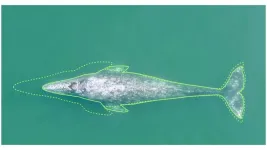(Press-News.org) Why do politicians lie and deny when they are caught up in political scandal?
According to a newly published study led by a University of Nebraska–Lincoln political scientist, the answer may be that their supporters prefer a less-than-credible denial to losing political power and in-group status because of a discredited standard-bearer.
“The driving question of our research is whether people are actually incentivizing politicians to deny wrongdoing and escape accountability,” said Pierce Ekstrom, assistant professor of political science at Nebraska.
“Certainly, there’s a very strong norm — and it may be stronger now than it ever has been — to stand behind the leader of the party. The more important and more indispensable a politician seems to be to the party, the more committed people are going to be toward defending that politician and seeing that politician defend themself.”
Ekstrom is lead author for “On the Defensive: Identity, Language and Partisan Reactions to Political Scandal,” published in May by the Personality and Social Psychology Bulletin. Other members of the research team are Marti Hope Gonzales of the University of Minnesota; Allison L. Williams of Beech Acres Parenting Center in Cincinnati, Ohio; Elliot Weiner of the Relay Graduate School of Education in New York City; and Rafael Aguilera of the University of Texas at El Paso.
In private life, it might seem more ethical for a wrongdoer to acknowledge their misdeed and seek forgiveness. Yet thousands of people who participated in three separate experiments since 2013 indicated they would continue to support a politician despite hostile and self-centered denials — particularly if the politician were a powerful member of their political party.
The study offers insights into why partisans seem to have different standards for different politicians.
“We as citizens should be honest with ourselves about what kind of behaviors we want in our leaders,” Ekstrom said. “Before a scandal hits, before we know the details, we should know where we draw the line for people we want to lead the country — because we know we’re inclined to move the goalposts for politicians from our own party.”
In the first experiment, conducted in 2013, 403 participants, both Republicans and Democrats, were recruited through Amazon’s Mechanical Turk crowdsourcing marketplace. Each person read one of 18 fabricated news stories describing accusations against “Roger Wimsatt,” a fictitious politician. The stories featured one of three scenarios involving illegal abuse of power: “Wimsatt” used his influence as a senior party official to coerce lawmakers into changing their vote on the Affordable Care Act; “Wimsatt” guided government contracts to businesses with close party ties; or “Wimsatt” ordered surveillance spyware planted in businesses across the country. The stories also rotated “Wimsatt’s” political party and his response to the allegation, whether an “aggravating” denial or a “mitigating” apology.
This experiment found that participants responded favorably to “Wimsatt’s” denials if they identified with his political party. While an apology did not hurt his standing with party loyalists, it was not as beneficial as a denial. Neither apology nor denial improved his standing with people in the opposing political party.
In a second experiment, in 2014, the researchers sought to better define situations where denials benefit wrongdoers. Using a sample of more than 1,100 people, they found participants were motivated to protect their party’s image — and feared their party could not achieve its goals if the politician were discredited.
In this experiment, participants read more fictitious news stories about “Wimsatt.” In some, he was described as a highly visible, national party leader, while in others he was a backbencher on a minor committee. In some articles, the scandal was explicitly political, where he was criticized by opposing party members for awarding contracts to party donors. In others, the misconduct was self-serving, where “Wimsatt” steered government contracts to his friends.
As in the first experiment, denials generated more favorable responses from participants who shared the wrongdoer’s party affiliation. Compared with saying nothing, politicians who denied wrongdoing were 12% more likely to maintain the support of people from their own party. They were even more likely to maintain support if they were high-status politicians and if their misconduct had partisan motivations.
“It seems that group-related motives specifically influence partisans’ susceptibility to aggravating accounts, allowing in-party politicians to ‘get away with’ hostile explanations for their behavior that would otherwise leave evaluators unmoved,” Ekstrom and his colleagues observed in the journal article.
In a third experiment in 2019, nearly 1,800 participants reviewed fictional news stories about “Doug Courser,” a fictional state senator from Florida. Participants were provided fictional news stories that accused “Courser” of criminal wrongdoing for personal gain — a drunk-driving cover-up, campaign finance fraud or tax evasion.
Some of the fictional news stories described “Courser” as a pivotal vote in a redistricting battle needed for his party to remain in control, while others said he had little influence. In some stories, “Courser” aggressively denied the allegations as “a desperate and disgusting attempt to smear his name.” In others, “Courser” acknowledged wrongdoing, saying “words could not express his regret.”
Again, the experiment showed denials consistently improved participants’ reactions to politicians from their own party — but only politicians from their own party — whether “Courser” was accused of drunk driving, embezzlement or cheating on his taxes.
“These results suggest that partisans are content for their leaders to deny misconduct specifically when they need those leaders to further party goals,” the researchers wrote. “In sum, both weak and strong partisans in our study responded favorably to party leaders who assured them that they were not crooks — but only to the extent that their party needed that particular leader, crooked or not.”
END
Study shows politicians deny misdeeds because we want to believe them
2024-06-12
ELSE PRESS RELEASES FROM THIS DATE:
Case study reveals important new details about rare second cancers related to CAR-T therapy
2024-06-12
WASHINGTON – A new detailed analysis of a patient’s second cancer after receiving CAR-T therapy for the initial cancer provides rare but important insights intended to offer helpful guidance for oncologists and pathologists about the clinical presentation and pathologic features involved in a CAR-T related second cancer.
The finding is reported June 13, 2024, in the New England Journal of Medicine.
CAR-T therapy is described by many as a new and promising treatment for blood cancers. CAR-T therapy is made from a patient’s ...
Risk of secondary cancers after CAR-T cell therapy low, according to large Stanford Medicine study
2024-06-12
A large study by researchers at Stanford Medicine has found that the risk of secondary blood cancers after CAR-T cell therapy — a cell-based cancer treatment that exploded on the scene in 2017 as a treatment for intractable blood cancers — is low, despite a Food and Drug Administration warning.
In November 2023, the FDA issued a warning about a risk of secondary cancers — particularly blood cancers — that may be associated with CAR-T cell therapy. The warning was preceded by a rising tide of ...
Mouse study identifies unique approach for preventing life-threatening complications after spinal cord injury
2024-06-12
COLUMBUS, Ohio – In response to stressful or dangerous stimuli, nerve cells in the spinal cord activate involuntary, autonomic reflexes often referred to as “fight or flight” responses.
These protective responses cause changes in blood pressure and the release of stress hormones into the blood stream. Normally, these responses are short-lived and well-controlled, but this changes after a traumatic spinal cord injury.
A first-ever study published in the journal Science Translational Research identifies a ...
Western agricultural communities need water conservation strategies to adapt to future shortages
2024-06-12
Reno, Nev. (June 12, 2024) – The Western U.S. is heavily reliant on mountain snowpacks and their gradual melt for water storage and supply, and climate change is expected to upend the reliability of this natural process. Many agricultural communities in this part of the country are examining ways to adapt to a future with less water, and new research shows that a focus on supplementing water supply by expanding reservoir capacity won’t be enough to avert future water crises.
Led by scientists at the Desert Research Institute ...
Does having a child with low birth weight increase a person’s risk of dementia?
2024-06-12
EMBARGOED FOR RELEASE UNTIL 4 P.M. ET, WEDNESDAY, JUNE 12, 2024
MINNEAPOLIS – People who give birth to infants less than 5.5 pounds may be more likely to have memory and thinking problems later in life than people who give birth to infants who do not have a low birth weight, according to a study published in the June 12, 2024, online issue of Neurology®, the medical journal of the American Academy of Neurology. The effect on memory and thinking skills was equivalent to one to two years of aging for those with low-birth-weight deliveries.
The study does not prove that delivery of a low-birth-weight ...
Depressive symptoms in young adults linked to thinking, memory problems in midlife
2024-06-12
EMBARGOED FOR RELEASE UNTIL 4 P.M. ET, WEDNESDAY, JUNE 12, 2024
MINNEAPOLIS – People who experience prolonged depressive symptoms starting in young adulthood may have worse thinking and memory skills in middle age, according to a study published in the June 12, 2024, online issue of Neurology®, the medical journal of the American Academy of Neurology. The study also found that depressive symptoms were experienced more often by Black adults than white adults.
“The processes that lead to dementia begin long before signs of the disease become apparent, and previous research has shown that Black adults have a higher risk of dementia than white adults,” said study author ...
Avoidable deaths during Covid-19 associated with chronic hospital nurse understaffing
2024-06-12
Philadelphia (June 12, 2024) – A new study published in International Journal of Nursing Studies showed that individuals with Covid-19 were more likely to die in hospitals that were chronically understaffed before the pandemic. This study is one of the first to document the continuing public health dangers of permitting so many U.S. hospitals to ration nursing care by understaffing nursing services.
The study, conducted by researchers at the Center for Health Outcomes and Policy Research (CHOPR) at the University ...
Convenient at-home test identifies at-risk individuals with inadequate immunity to COVID-19
2024-06-12
By late in the pandemic more than 96% of individuals in the U.S. ages 16 and older had COVID-19 antibodies from infection or vaccination. However, immunity from the virus tends to wane over time. Uptake of the boosters has been quite low, meaning that over time the current high levels of protection will dissipate.
During the COVID-19 pandemic, at-home antigen tests became widely accepted for detecting infection. In a new joint study by the George Washington University, the University of North Carolina, and others, researchers looked into the benefits of using at-home antibody tests to detect immunity and to make decisions about the need for a COVID-19 booster shot - something ...
Sweetpotato’s sweet revenge
2024-06-12
Sweetpotato black rot is a devastating disease caused by the fungus Ceratocystis fimbriata. Since the late 1800s, black rot of sweetpotato has threatened to destroy as much as 30% of the sweetpotato crop in the United States. In 2015, all sweetpotato-producing states in the United States experienced one of the worst outbreaks recorded in history, with up to 60% losses reported. While fungicides can help manage the disease, they are not a sustainable solution, especially with volatile restrictions on fungicide residues among major export markets. An additional ...
Pacific coast gray whales have gotten 13% shorter in the past 20-30 years, Oregon State study finds
2024-06-12
Gray whales that spend their summers feeding in the shallow waters off the Pacific Northwest coast have undergone a significant decline in body length since around the year 2000, a new Oregon State University study found.
The smaller size could have major consequences for the health and reproductive success of the affected whales, and also raises alarm bells about the state of the food web in which they coexist, researchers say.
“This could be an early warning sign that the abundance of this population is starting to decline, or is not healthy,” said K.C. Bierlich, co-author on the study and an assistant professor at OSU’s ...




